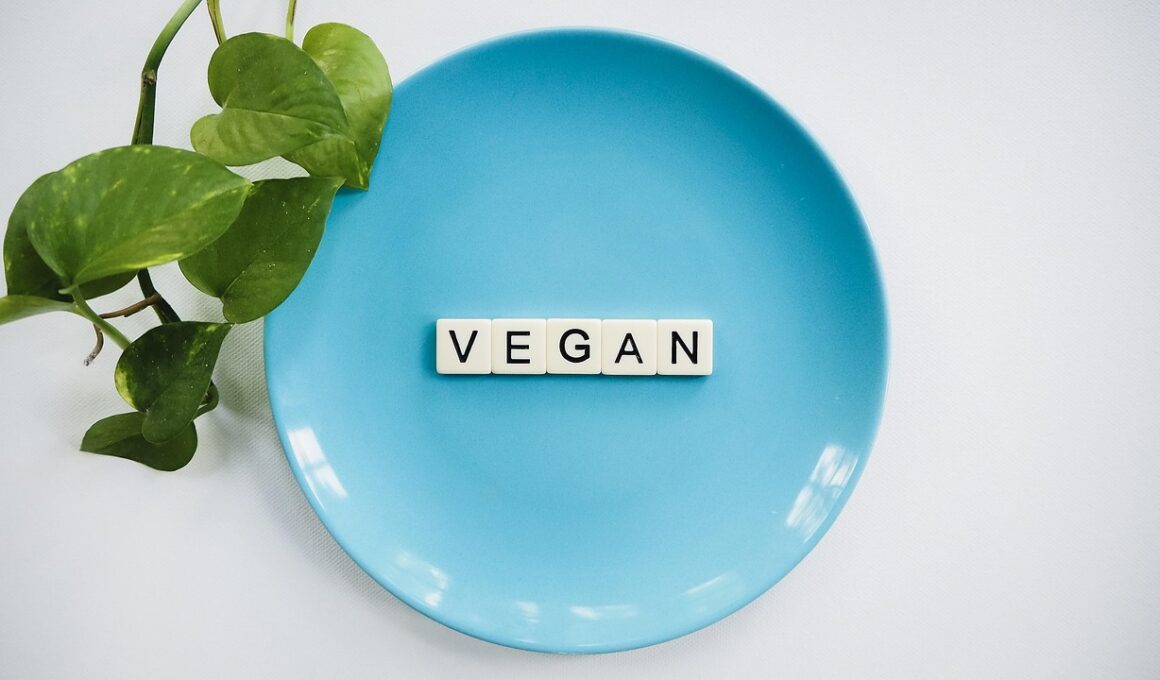Supplementing a Vegan Diet for Dogs: Vitamins and Minerals
The rising trend of veganism extends to the canine world, leading many dog owners to explore vegetarian and vegan diets for their pets. However, transitioning to a vegan diet for dogs requires meticulous planning to ensure they receive essential nutrients. Unlike cats, dogs are omnivores with varying dietary needs. It’s paramount to include supplementary vitamins and minerals in their meals. Common concerns arise regarding potential deficiencies in proteins, vitamins, and essential fatty acids. A well-rounded vegan diet may include plant-based proteins like peas, lentils, and chickpeas. When committed to this lifestyle for your dog, always consult a veterinarian or a pet nutrition expert. They can provide tailored advice that meets your dog’s unique needs. Ensuring that the diet is balanced and fortified with necessary nutrients is crucial. Incorporating a mix of whole grains, fruits, and vegetables is an excellent starting point. Remember that not all plants are safe for dogs, so research thoroughly before introducing new foods.
Dogs need specific nutrients such as Vitamin B12, iron, and certain amino acids that may be scarce in a vegan diet. Vitamin B12 primarily comes from animal products. Therefore, it is crucial to add B12 either through fortified foods or supplements. Supplements may vary significantly in their chemical compositions, so choose wisely. Foods like nutritional yeast can be a valuable source of this vitamin, providing safety and dietary benefits. Additionally, dogs require omega-3 fatty acids for skin and coat health, which can be found in flaxseeds and chia seeds. Incorporating these foods into a vegan dog diet can help bridge nutritional gaps. Furthermore, always monitor your dog for any signs of deficiencies, such as lethargy, poor coat condition, or gastrointestinal issues. A balanced diet is essential for a dog’s overall health and vital organ function. As with any diet change, gradual transitions and regular check-ins with your vet can aid in successful adaptation. It’s crucial to observe changes in behavior or health during this transition.
The Importance of Balanced Nutrition
When adopting a vegan diet for dogs, the significance of balanced nutrition cannot be overstated. Dogs require a variety of nutrients to thrive, which often means adjusting their diet to meet these needs. Consulting with a veterinarian helps create a comprehensive meal plan tailored to your dog’s specific health requirements. Nutritional needs differ based on age, activity level, and breed, necessitating a personalized approach. Essential supplements should include high-quality protein sources like quinoa or hemp seeds, ensuring your dog receives amino acids critical for growth and maintenance. Mixing a colorful array of vegetables and fruits can offer antioxidants that support immune function. While a plant-based diet can be healthy, it may lack vital nutrients usually found in meat. It’s essential to understand these gaps to avoid deficiencies. Furthermore, some dogs may experience digestive issues when switching to a vegan diet, so gradual introduction of new foods is advisable. Pay attention to how your dog responds to dietary changes and adjust accordingly, as each dog has unique preferences and needs that must be addressed.
Regular monitoring of your dog’s health during this transition is vital, as not all dogs will adapt equally to a new diet. Over time, you may notice significant improvements in energy levels, coat quality, and overall well-being, provided their nutritional needs are adequately met. Each dog’s body responds differently to diet changes, and seeing your vet regularly can help catch any issues early. Incorporating supplements specifically designed for dogs can further enhance their nutrition. Certain brands offer well-balanced formulas that include essential vitamins and minerals suited for canine needs. Always ensure the supplement is made specifically for dogs to avoid potential toxicity from human formulations. Choose high-quality products from trustworthy brands that prioritize pet nutrition. Additionally, enriched whole foods can help mitigate deficiencies that might arise from a vegan diet. Educate yourself about canine nutrition and stay updated with the best practices in vegan dog diets, ensuring your pet remains happy and healthy. Alternatively, many pet owners opt for pre-packaged vegan dog foods that conform to AAFCO standards, ensuring dietary safety.
Protein Sources and Their Significance
Protein is a critical nutrient for dogs, playing a vital role in multiple bodily functions. Supplementing your dog’s vegan diet with diverse protein sources is essential to keep them healthy. Plant-based proteins can come from various sources, including legumes, nuts, and seeds. However, these protein sources must be complemented to provide a complete amino acid profile. For example, combining grains like corn with legumes like beans can achieve a more balanced intake of proteins. It is indispensable that vegan diets for dogs effectively cater to their protein needs, especially for active or working breeds, which require more significant dietary contributions. Additionally, dogs need protein for muscle development, immune system function, and overall energy levels. Many dog owners overlook the importance of not just quantity but quality of protein sources. Opt for organic and non-GMO sources whenever possible, as these will support your dog’s health better over time. Avoid over-processing food, which may reduce the nutrient content. Regular adjustments based on your dog’s responses to food changes can aid in ensuring they receive adequate supplementation.
Minerals such as calcium and phosphorus are equally important when discussing a vegan diet for dogs. Plant-based calcium sources can be less bioavailable than those found in animal products. Therefore, it’s imperative to add supplements or specific food sources that can provide adequate mineral levels. Popular plant sources for calcium include leafy greens like kale and broccoli. However, phosphorus levels in plant food may not always meet your dog’s needs. So, it’s necessary to include premium mineral supplements that conform to canine dietary requirements. Be wary of using too much phosphorus from plant sources as it can lead to imbalances in their diet. Create a balanced feeding routine that incorporates these necessary vitamins and minerals. This will facilitate optimum health and wellness for your canine companion. Always read labels carefully and consider engaging with a nutritionist who specializes in pet diets. Educating yourself about the nutritional aspects of vegan dog diets will not only benefit your pet but also enrich your experience as a responsible pet owner. Conclusively, a well-rounded vegan diet requires considerable attention to ensure your pet thrives.
Conclusion: A Holistic Approach to Dog Nutrition
In summary, adopting a vegan diet for dogs involves careful consideration of their nutritional needs and sufficient supplementation. Addressing protein, vitamins, and minerals is essential for maintaining a healthy and happy pet. While some may feel apprehensive about whether a vegan diet is appropriate for their dogs, reassurance comes from nutritional research and guidance from veterinary professionals. Balancing diets with proteins, appropriate supplements, and a variety of plant foods can enhance your dog’s overall well-being. Stay informed by focusing on your dog’s health, responding to their specific needs, and being prepared to make adjustments as necessary. Many vegan dog food brands now prioritize balanced nutrition, making it easier for conscientious pet owners to nourish their dogs effectively. Each aspect of your dog’s diet contributes to their long-term health, so aim for comprehensive nutritional knowledge and understanding. This holistic approach to dog nutrition can lead to positive health outcomes, fostering a rewarding bond between you and your four-legged friend. Ensure that your vegan dog’s diet evolves with them, keeping their best interests at heart throughout their lives.
Making informed decisions requires understanding the potential risks and benefits of a vegan diet for your pet. Combine the feedback you get during consultations with your vet with ongoing research to find the most beneficial approach. Note that you should take greater care as your dog ages, since their nutrient needs may change over time. Foster open communication with your veterinarian about any health changes as you implement dietary transitions. With persistent attention and a commitment to learning, you can create a nutritious, vegan-friendly meal plan tailored to the unique needs of your dog. Thus, the journey toward a balanced vegan diet for your dog can be well worth the effort. The joy in knowing that you’re doing right by your companion cannot be understated. After all, a well-fed pet is often a happy and vibrant pet. Be proactive in educating yourself about all aspects of vegan dog nutrition, including seasonal foods and efficient supplementing. By doing so, you’re investing in a healthier future for your furry friend, making considerable strides towards ensuring their well-being.


